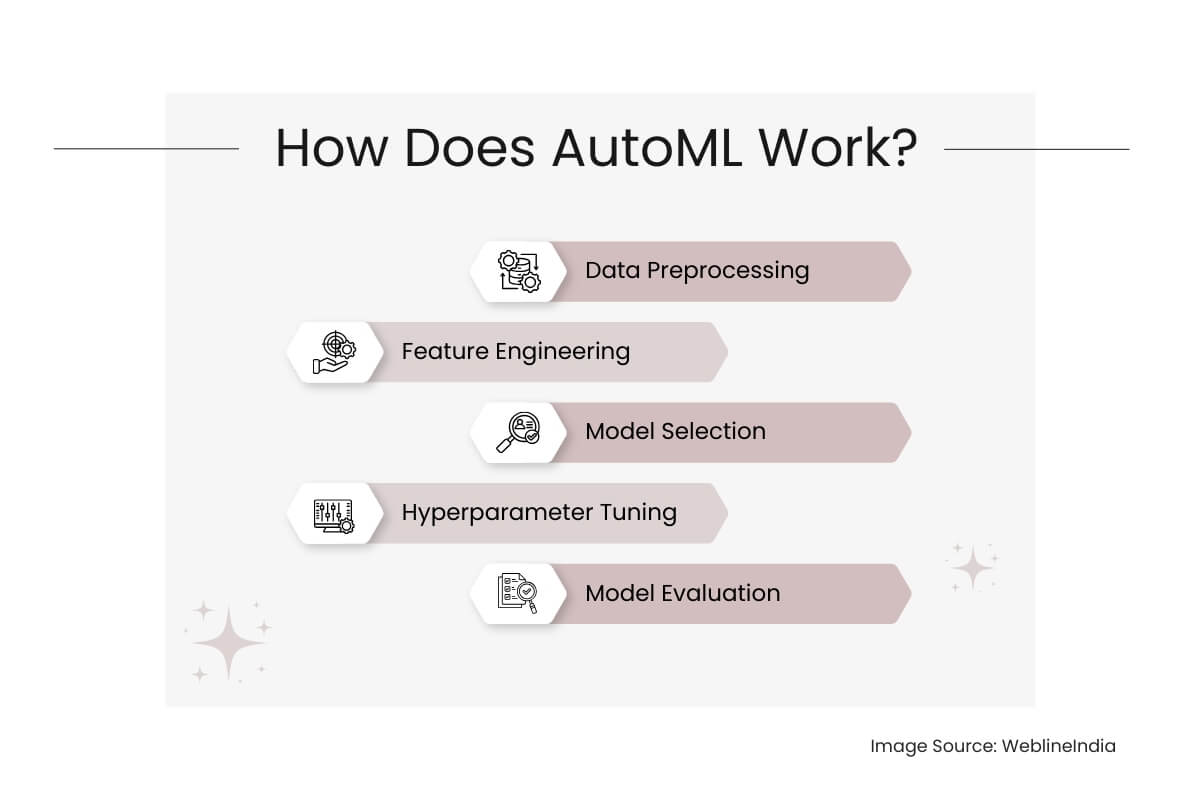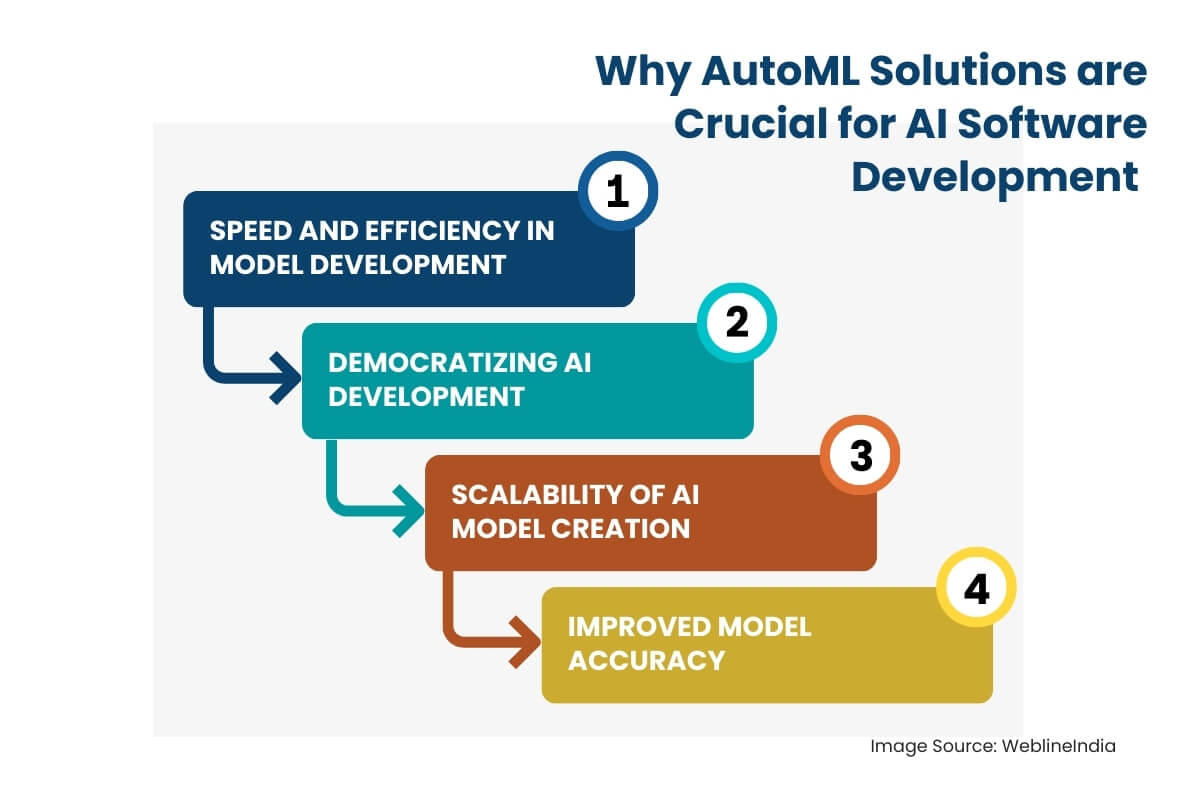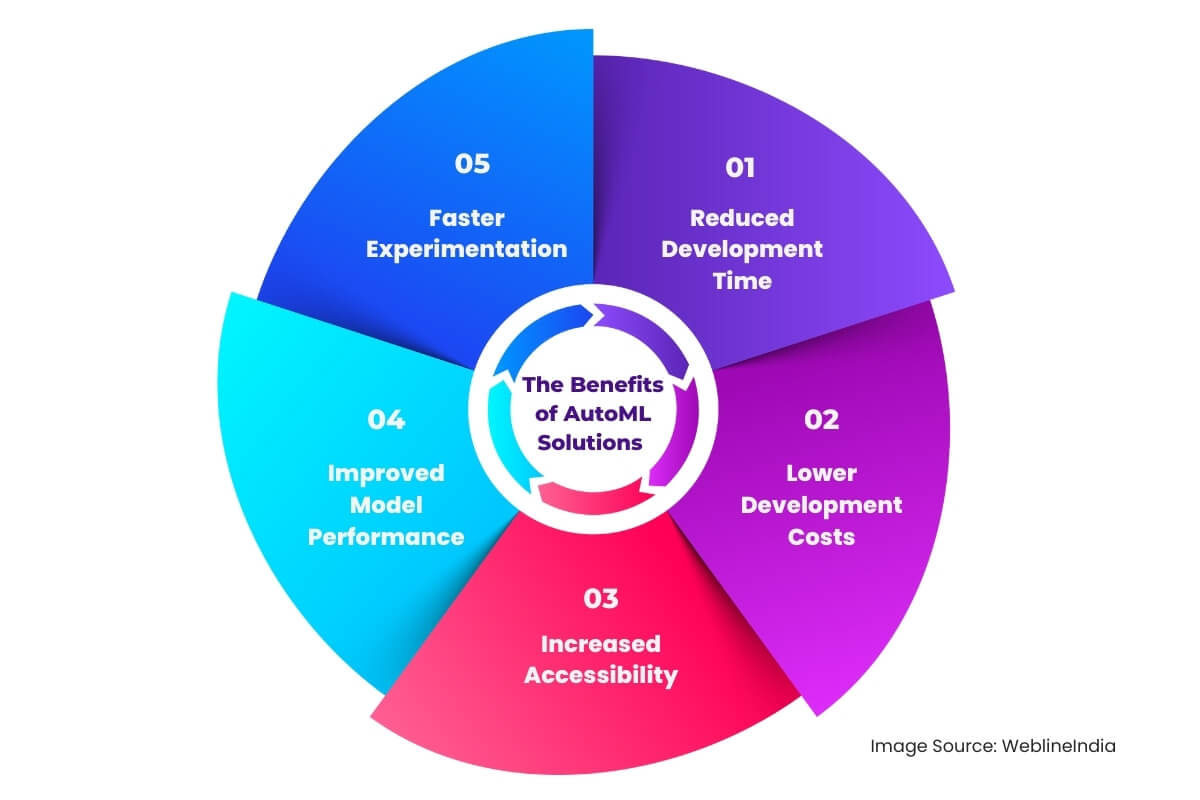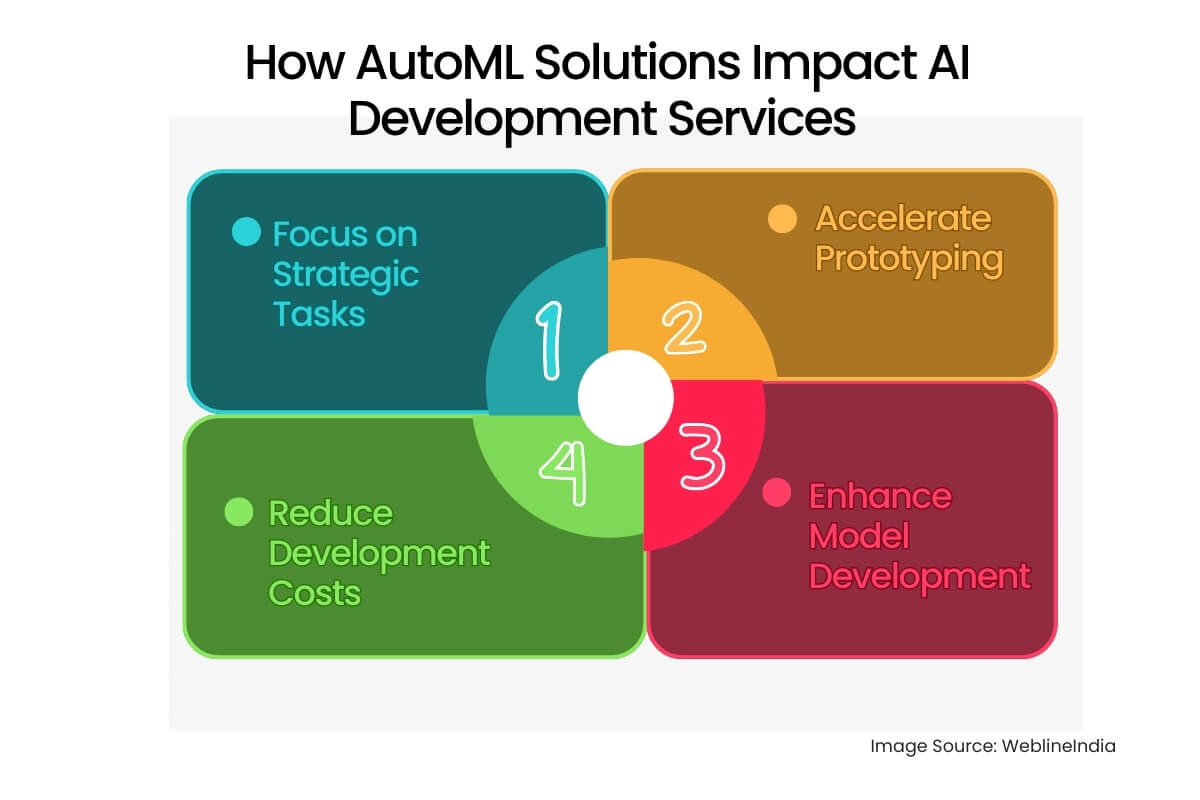Listen to the podcast :
The rapid evolution of artificial intelligence (AI) has reshaped industries, businesses, and entire sectors. The research giant Statista quotes that in 2020, the global industrial automation market was valued at approximately 175 billion U.S. dollars. It is projected to grow at a compound annual growth rate (CAGR) of about nine percent through 2025, reaching an estimated 265 billion U.S. dollars by that year.

Source: Statista on Industrial Automation Worldwide
However, building robust AI models from scratch remains a complex and resource-intensive process. Traditionally, AI model development requires deep expertise in machine learning (ML), data engineering, and programming. This is where AutoML solutions come into play—automating much of the AI development services process and drastically reducing the barriers to AI adoption for organizations across various fields.
In this blog, we’ll explore what AutoML solutions are, their benefits, how they work, and the key role they play in AI software development. Through automation, AutoML solutions simplify the traditionally complex aspects of AI development, allowing even non-technical users to build powerful machine-learning models.
Want to automate AI development? Get expert-driven AutoML solutions for your business!
What is AutoML?
AutoML (Automated Machine Learning) refers to a suite of tools and techniques designed to automate the end-to-end process of building machine learning models. From data preprocessing to model training and evaluation, AutoML solutions enable users to automate tasks that were once reliant on deep technical expertise. This technology allows organizations to apply machine learning without needing highly skilled data scientists or machine learning engineers at every step of the process.
Unlike traditional methods where developers have to manually design algorithms, select features, tune hyperparameters, and evaluate models, AutoML solutions take over much of this work automatically. The result is faster AI model development with fewer errors, lower costs, and reduced time to market.
How Does AutoML Work?
At its core, AutoML solutions consist of several key stages that are automated to improve the efficiency and accuracy of machine learning workflows.
These stages typically include:

- Data Preprocessing: Automatically cleaning and preparing data for machine learning models, including handling missing values, scaling features, and encoding categorical variables.
- Feature Engineering: Automatically selecting the most relevant features from the data for the machine learning model.
- Model Selection: Automatically choosing the best machine learning algorithm based on the dataset and problem type.
- Hyperparameter Tuning: Optimizing the parameters of the selected model to improve performance.
- Model Evaluation: Testing the model on separate validation or test datasets to assess its effectiveness.
AutoML solutions enable users to bypass many of the tedious, time-consuming steps of AI model creation, providing an intuitive user experience while delivering high-quality, accurate models.
Why AutoML Solutions are Crucial for AI Software Development?
AutoML solutions are crucial for AI software development as they automate time-consuming processes like model training, feature selection, and hyperparameter tuning. This accelerates development, reduces human error, and allows non-experts to create effective models. Ultimately, it makes AI more accessible while improving accuracy and scalability across various industries.
Here are some factors to consider:
1. Speed and Efficiency in Model Development
One of the primary advantages of AutoML solutions is the accelerated development cycle they offer. Traditionally, building a machine learning model could take weeks or months, depending on the complexity of the task. Through automation, AutoML solutions drastically reduce development times. Non-technical users can quickly create models, test multiple iterations, and deploy them with minimal manual intervention.
This speed significantly impacts industries where time-to-market is a critical factor. For instance, whether through AI development outsourcing or in-house teams, companies in e-commerce, finance, healthcare, and marketing can accelerate their workflows using AutoML solutions—allowing them to deploy models faster and stay competitive in their respective industries.

2. Democratizing AI Development
AI development has traditionally been reserved for data scientists, machine learning engineers, and researchers, all of whom require specialized skills to build effective AI models. AutoML solutions are changing this dynamic by democratizing AI development and making it accessible to users with limited technical expertise.
Thanks to AutoML solutions, businesses can empower their teams—regardless of technical background—to create custom AI models. For instance, product managers or domain experts who understand the business problem but lack coding knowledge can now experiment with AI models and optimize them to solve specific business challenges.
3. Scalability of AI Model Creation
Another key benefit of AutoML solutions is the ability to scale AI model development. In an enterprise setting, there may be a need to deploy multiple models across various departments or applications. Managing and developing each model manually would be time-consuming and inefficient. With AutoML solutions, organizations can quickly build and deploy numerous AI models in parallel, ensuring that every department can benefit from AI-powered insights and automation.
AI development services that rely on AutoML solutions can scale AI capabilities across multiple use cases—whether it’s for marketing optimization, fraud detection, predictive maintenance, or customer segmentation—without overburdening the development team.
4. Improved Model Accuracy
The accuracy of machine learning models is crucial for their effectiveness. AutoML solutions can significantly improve model performance by using advanced optimization techniques that fine-tune models and select the best algorithms for a given task. Through automated hyperparameter optimization and model selection, AutoML solutions are capable of achieving results that are comparable to those developed by highly skilled data scientists.
Additionally, AutoML solutions reduce the risk of human error and biases that often arise when experts manually design models or choose features. As a result, businesses can trust the models developed through AutoML solutions to make informed decisions based on accurate predictions.
Struggling with complex AI models? Let our AutoML solutions simplify your workflow!
The Role of AI Software Development in AutoML Solutions
Facilitating AI Model Creation Through Software Engineering
AI software development plays an essential role in the creation and improvement of AutoML solutions. The backend technologies and software engineering practices used to build these platforms ensure that they can handle complex machine learning workflows and scale efficiently. From data processing to model deployment, the development of AutoML solutions relies on sophisticated software engineering to deliver a seamless, user-friendly experience.
AI software development ensures that AutoML solutions can integrate with various data sources, machine learning libraries, and cloud platforms to enable easy deployment of models in diverse environments. Without this solid foundation of software development, AutoML solutions would lack the robustness and flexibility required to handle diverse datasets and business needs.
Combining Machine Learning with Software Engineering
The development of AutoML solutions is not only about automating machine learning tasks but also integrating those tasks into broader AI software development efforts. This integration ensures that businesses can apply AutoML solutions effectively within their existing systems, whether it’s for real-time data processing, automated decision-making, or customer-facing applications.
For example, integrating an AutoML solution into a customer support system can automate ticket classification, route requests, and provide insights from past interactions, thereby improving service quality and reducing response times. This combination of AI software development with AutoML solutions provides businesses with powerful, end-to-end automation tools to optimize processes.
Business Benefits of AutoML in AI Development
AutoML solutions offer a range of advantages for businesses and individuals looking to implement AI. These benefits extend across various stages of AI software development and impact the delivery of AI development services.
- Reduced Development Time: AutoML solutions automate many of the manual steps involved in building AI models, drastically reducing the time required for development. This allows businesses to quickly prototype and deploy AI applications, accelerating time-to-market.
- Lower Development Costs: The automation provided by AutoML solutions reduces the need for highly specialized machine learning engineers, lowering the overall cost of AI development services. This makes AI more accessible to smaller businesses and organizations with limited resources.

- Increased Accessibility: AutoML solutions make AI development accessible to a wider audience, including those without deep expertise in machine learning. This democratizes AI development and empowers individuals with domain expertise to build their own AI applications.
- Improved Model Performance: AutoML solutions often incorporate advanced algorithms and best practices for model selection and hyperparameter tuning, leading to improved model performance and accuracy. They can explore a wider range of potential models and configurations than a human expert could, potentially uncovering superior solutions.
- Faster Experimentation: AutoML solutions enable rapid experimentation with different models and configurations, allowing developers to quickly identify the best approach for a given problem. This accelerates the iterative development process and facilitates faster innovation.
Challenges in Implementing AutoML Solutions
While AutoML solutions offer numerous benefits, there are certain challenges organizations must consider when implementing them:
- Data Quality: AutoML solutions depend on high-quality, well-labeled data to function effectively. Poor-quality data can lead to inaccurate models, regardless of the automation in the process.
- Limited Customization: Although AutoML solutions can automate many aspects of AI development, they may not always offer the same level of customization and fine-tuning as manual development processes. Organizations with highly specific AI needs might find the automated solutions too generalized.
- Model Interpretability: Automated models can be more difficult to interpret, which could be problematic in industries that require model transparency for regulatory or decision-making purposes.
How AutoML Solutions Impact AI Development Services?
AutoML solutions are transforming the landscape of AI development services. While they don’t entirely replace the need for human expertise, they augment the capabilities of AI development teams and allow them to focus on more complex and strategic tasks.
AutoML solutions can be used to:

- Focus on Strategic Tasks: AutoML solutions free up valuable time by handling tasks like hyperparameter tuning and model selection, making it more efficient for companies to hire AI developers who can focus on strategic activities such as data analysis, feature engineering, and business problem definition.
- Accelerate Prototyping: AutoML solutions allow AI development services providers to quickly prototype AI applications and demonstrate their feasibility to clients. This speeds up the initial stages of project development and facilitates faster client onboarding.
- Reduce Development Costs: AutoML solutions can lower the costs associated with AI development services, making AI more accessible to a wider range of businesses. This allows AI development services providers to offer competitive pricing and attract more clients.
- Enhance Model Development: AutoML solutions can assist AI development services teams in building more accurate and robust AI models. They can be used to explore a wider range of models and configurations, leading to improved performance and better results for clients.
The Future of AutoML
AutoML solutions are continuously evolving, with ongoing research and development focused on improving their capabilities and expanding their scope. Future developments in AutoML solutions are likely to include:
- Enhanced Automation: AutoML solutions will become even more automated, requiring less human intervention and further simplifying the AI development process.
- Improved Model Explainability: Future AutoML solutions will provide better insights into how AI models make decisions, increasing transparency and trust in AI systems.
- Support for More Data Types: AutoML solutions will be expanded to support a wider range of data types, including unstructured data such as text and images.
- Integration with MLOps Platforms: AutoML solutions will be seamlessly integrated with MLOps platforms, streamlining the entire machine learning lifecycle from development to deployment and monitoring.
The Future of AutoML Solutions in AI Software Development
As AI continues to evolve, AutoML solutions are making it easier for businesses to incorporate machine-learning models into their operations. The benefits of increased speed, reduced cost, and the ability to scale AI initiatives are transforming the way organizations approach AI development services.
AI software development will continue to be integral to the future of AutoML solutions, enabling even more powerful, user-friendly, and customizable platforms. As AutoML solutions improve, businesses of all sizes will have the ability to develop sophisticated AI models quickly and efficiently, driving innovation and operational excellence across industries.
You can opt for the combination of AutoML solutions and the best AI software development to democratize AI, making it accessible to wider customers or clients and accelerating the development of intelligent, data-driven business processes for your business.
Social Hashtags
#AutoML #AIAutomation #MachineLearning #ArtificialIntelligence #AIForBusiness #DigitalTransformation #SmartSolutions #AIDevelopment #MLTools #AIEngineering #AIinSoftware #AIinBusiness #NextGenAI
Ready to scale AI in your business? Leverage AutoML with our AI software development expertise!
Frequently Asked Questions
Testimonials: Hear It Straight From Our Global Clients
Our development processes delivers dynamic solutions to tackle business challenges, optimize costs, and drive digital transformation. Expert-backed solutions enhance client retention and online presence, with proven success stories highlighting real-world problem-solving through innovative applications. Our esteemed Worldwide clients just experienced it.
Awards and Recognitions
While delighted clients are our greatest motivation, industry recognition holds significant value. WeblineIndia has consistently led in technology, with awards and accolades reaffirming our excellence.

OA500 Global Outsourcing Firms 2025, by Outsource Accelerator

Top Software Development Company, by GoodFirms

BEST FINTECH PRODUCT SOLUTION COMPANY - 2022, by GESIA

Awarded as - TOP APP DEVELOPMENT COMPANY IN INDIA of the YEAR 2020, by SoftwareSuggest